Why is my AC blowing warm air? 5 common reasons for Texas homes include thermostat issues, dirty filters, refrigerant leaks, dirty condenser coils, and electrical problems. This article will help you learn how to fix them.
Quick Facts
- Check and adjust thermostat settings regularly to prevent warm air from blowing, it’s a common issue.
- Dirty filters can block airflow and reduce cooling efficiency; replace regularly to maintain optimal AC performance.
- Refrigerant leaks and dirty condenser coils can severely impact the AC’s ability to cool. Have a professional inspect and maintain it to address the issue.
Thermostat Settings Issues
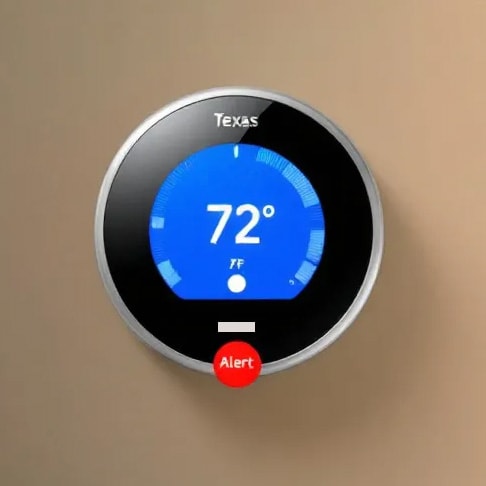
When your air conditioner is blowing warm air, one of the first things to check is the thermostat settings. This is a simple issue. If your thermostat is set to ‘heat’ instead of ‘cool’, it will blow warm air from the AC unit and hot air will flow through your space. This seems obvious, but it’s an easy mistake to make, especially if you just switched from heat to cool.
Incorrect thermostat settings can cause warm air to circulate from your outdoor AC unit. To cool effectively:
- Set the thermostat to a temperature below the current indoor temperature.
- Check and adjust the thermostat settings regularly to prevent the issue from happening again.
- For battery-operated thermostats, check and replace the batteries as needed to work.
If the issue persists after checking the settings, you may need to recalibrate or replace the thermostat. Consistent cooling requires accurate temperature readings and correct settings. Have a professional check your thermostat to ensure it’s working correctly and your air conditioning system is running efficiently.
Dirty Air Filters
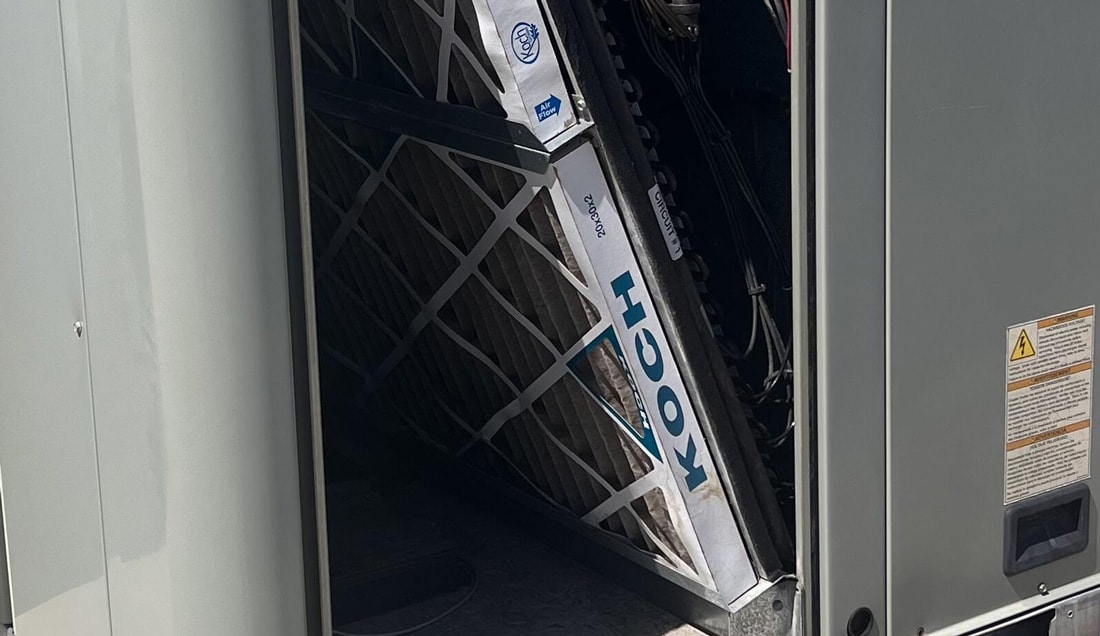
Dirty air filters is another common reason why your air conditioner is blowing warm air. When air filters are dirty, they block airflow, reducing the cooling efficiency of your AC system.
This restriction limits the heat exchange necessary for cooling, so your system can’t function properly. Essentially, if the cool air and cold airflow can’t blow air freely, it can’t cool, often resulting in the air conditioner blowing cold air.
Change air filters regularly
Changing air filters regularly maintains proper airflow and ensures AC works efficiently. Key points to remember:
- Check and replace air filters every 1-3 months, depending on usage and the presence of pets or dust.
- Neglecting this can restrict heat absorption.* It will eventually freeze up.
Clogged air filters not only affect cooling efficiency but also indoor air quality. Dirty filters can circulate air, including outdoor air:
- Dust
- Pollen
- Other allergens
These can be especially bad for people with allergies or respiratory issues. Cleaning a clogged air filter improves AC performance and indoor air quality.
Sometimes changing the air filters alone may not be enough and additional steps may be needed:
- If warm air persists after clean filters, a dirty evaporator coil or condenser coils might be the issue.
- These components are crucial for heat exchange.
- Their maintenance is important for overall AC efficiency.
Refrigerant Leaks
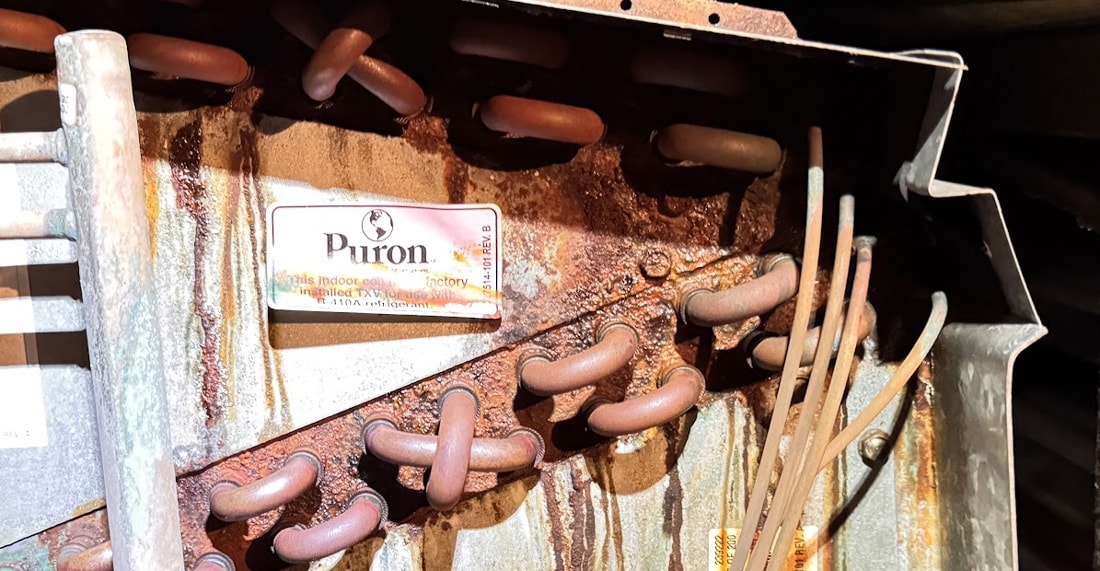
Refrigerant leaks are a more technical issue that can cause your air conditioner to blow warm air. The refrigerant in your AC system absorbs heat from the indoor air and releases heat outside. When there’s a refrigerant leak, the levels drop and the AC can’t absorb heat, so warm air comes out of the unit.
Leaks in the refrigerant line
Refrigerant leaks often occur due to insufficient refrigerant, which can be caused by leaks in the refrigerant line. Wear and tear, corrosion or physical damage to the refrigerant lines can cause these leaks. Only qualified technicians should diagnose and repair refrigerant leaks. HVAC pros have the tools and expertise to locate, fix leaks and recharge the refrigerant to the correct levels.
Suspected refrigerant leaks should be addressed immediately. Low refrigerant levels affect cooling efficiency and can damage your air conditioning system further. Regular maintenance and inspections by a pro can help identify and prevent refrigerant leaks so your AC unit stays in top shape.
Dirty Condenser Coils
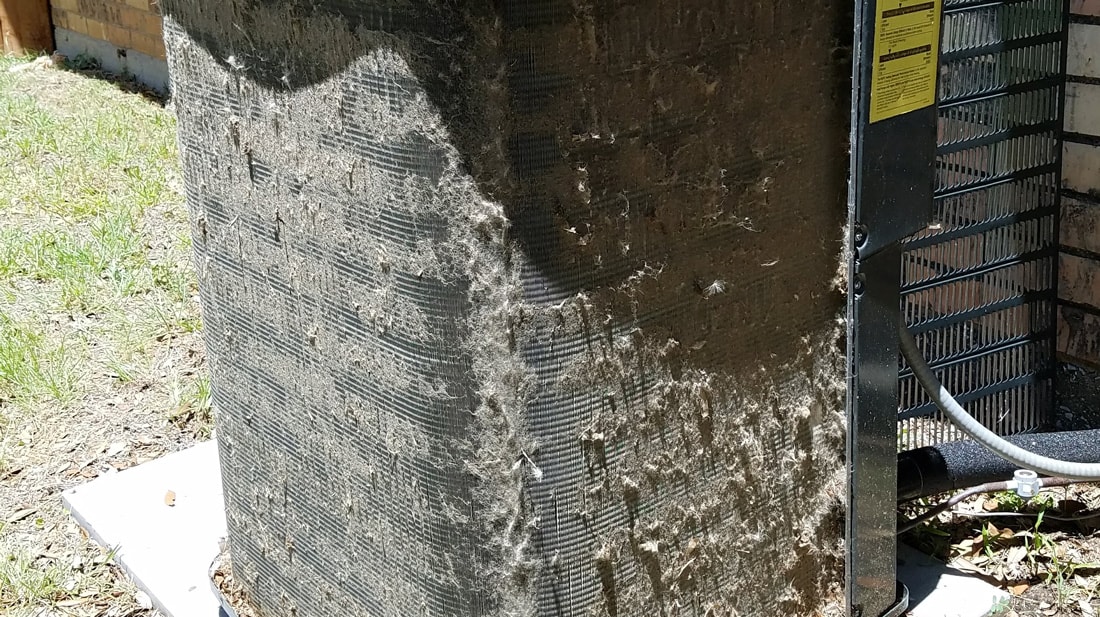
Dirty condenser coils is another common reason why your central air conditioner is blowing warm air. The condenser coils release the absorbed heat outside. When these coils are dirty, the heat exchange process is compromised and overall system temperatures rise and the AC blows warm air or even hot air.
Regular cleaning of condenser coils and evaporator coils is important for heat exchange and the overall cooling process. Gently remove debris and dirt from the coils using a soft brush or vacuum cleaner.
A case from life

Our client from Richardson reported poor cooling performance of his HVAC system and rising energy bills.
Airmatics technician arrived in an hour. Upon the inspection, we found the condenser coil coated in dirt, debris and buildup.
We used special coil cleaning solutions and equipment to clean this condenser coil. Also, we’ve checked the full system to make sure it runs smooth and efficiently. If you experience any issues with your HVAC systems, don’t hesitate to contact us.
Call Airmatics to clean the extremely dirty evaporator coils
If the coils are extremely dirty, consider hiring a professional to clean them. This will maintain AC efficiency and prevent it from blowing warm air.
Condenser coils need regular maintenance
Regular maintenance of condenser coils improves cooling efficiency and extends the life of your AC unit. Clean coils allow for better heat exchange, reduce the load on your air conditioner and the overall cooling system.
Maintenance of condenser coils can lead to lower energy bills and a more comfortable living space, and enhance the cooling ability of the unit.
Air conditioners also benefit from this maintenance for optimal energy efficiency and performance.
Electrical Problems
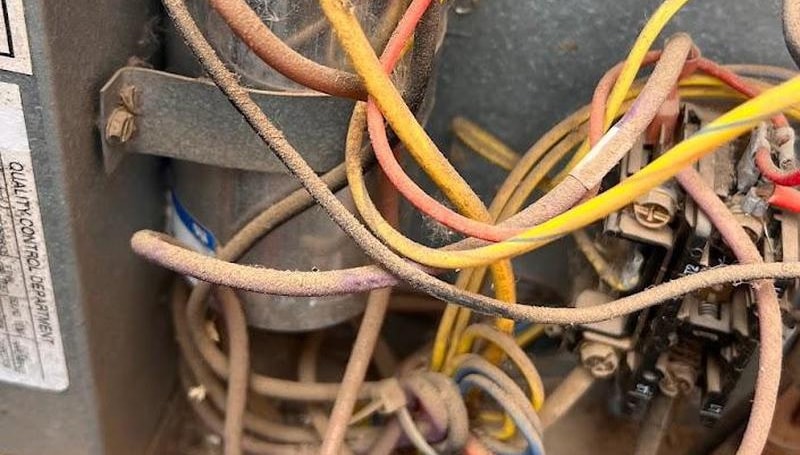
Electrical problems can disrupt the cooling efficiency of your AC system and cause warm air circulation. Tripped circuit breakers and blown fuses can prevent your air conditioner from working properly. Excessive power demand can trip a circuit breaker, often means there’s an AC issue in the system.
Tripped circuit breaker
Reset a tripped circuit breaker by flipping the switch off and then on again. If the breaker continues to trip, it might mean a serious electrical problem that needs professional attention. Faulty wiring or malfunctioning capacitors can affect your AC operation. Visible damage like cracks or ash on fuses can mean a blown fuse.
While resetting the circuit breaker or replacing a blown fuse can fix some electrical problems, others may require practical solutions or professional expertise. If you’re not comfortable with electrical components, seek professional help to avoid further damage and ensure AC operation.
Electrival component inspections
Regular maintenance and inspections can identify potential electrical problems before they become major issues. Addressing these problems promptly can prevent your air conditioning system from blowing warm air and ensure it works properly.
Call Now for AC Service! We’ll Restore Your Comfort!
Emergency AC repair services are available in Plano and surrounding cities
Summary
In summary, an air conditioner blowing warm air can be caused by many issues, from simple thermostat settings to more complex problems like refrigerant leaks and electrical issues. Knowing these common causes and how to fix them can help you stay cool at home especially during hot Texas summers.
Regular maintenance and timely professional intervention is key to having your air conditioning system work efficiently. By regularly checking and adjusting thermostat settings, changing air filters, and maintaining condenser coils, you can prevent many common issues that cause your AC to blow warm air.
Remember, if you encounter more complex problems like refrigerant leaks or electrical issues, it’s best to call a professional HVAC technician. By being proactive and addressing problems immediately, you can have a cool home all summer long.
FAQs
Your air conditioner may be blowing warm air because of incorrect thermostat settings, dirty air filters, refrigerant leaks or dirty condenser coils. Check these first to get it working properly.
Every 1-3 months, depending on usage and presence of pets or dust in your home. Regular maintenance ensures good air quality and system efficiency.
If your thermostat settings are correct but your AC is blowing warm air, check for dirty air filters, refrigerant leaks and dirty condenser coils. If none of these are the cause, call a professional HVAC technician.
Yes, you can clean the condenser coils yourself with a soft brush or vacuum, but if they are very dirty, it’s better to hire a pro for a more thorough cleaning.
Call a professional for your AC problems when you have complex issues like refrigerant leaks, electrical problems or ongoing warm air, even after basic troubleshooting. Addressing these problems with a qualified HVAC technician immediately can prevent further damage and ensure your system works properly.